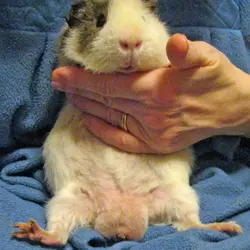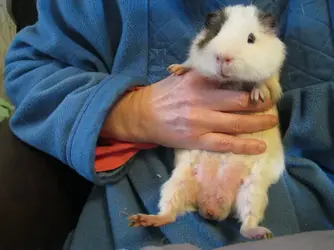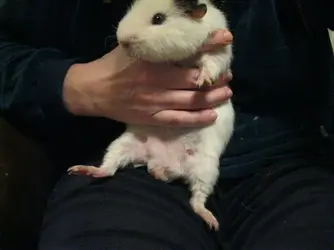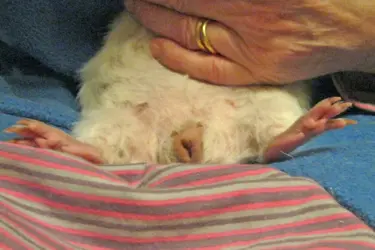1 When is neutering useful and when not?
- What neutering won't do
- When boar neutering is useful
2 Pre-op considerations
- Finding the right vet
- Operation cost
3 Neutering age
- When is a boar too old?
- Neutering after the testicles have descended
- Baby neutering (Frühkastration)
4 The operation
5 Post-op care and recovery
- What to do when complications happen?
- List of the most common post-op complications
6 The necessary 6 weeks post-op safety wait
7 A real-life example of a successful recovery
- Before and after pictures
- Teenage hormone experience in a freshly neutered boar
Conclusion
1 When is neutering useful and when not?
What neutering won't do for your boars
Most people think that neutering/de-sexing boars will save their feuding teenage boars. Unfortunately, that is exactly what it does NOT do in guinea pigs!
It only takes away the ability to make babies, but it doesn't change personality, outlook and cannot prevent dominance clashes; it won't instantly calm down your boys and will not prevent hormone spikes.
It most definitely does not change interactive social behaviours, of which rumble-strutting, mounting and chasing are dominance behaviours that are practised by both genders.
So - why neuter your boars at all then? There are still some good reasons why...
When is boar neutering useful?
Dealing with the results from mis-sexing situation or an unplanned pregnancy
If you have suffered an unplanned pregnancy due to being sold a mis-sexed pair or an already pregnant sow, then you may want to consider having dad or a single male pup neutered so they can live with your sows again in the longer term. This goes for all odd numbers of boars you end up with as an alternative to finding a new boarmate for your leftover boar, especially if you do not want any more guinea pigs.
Until a reunion is possible and safe, a single boar CAN live next to sows with interaction through the bars (provided that he cannot climb over or wiggle through when they are in season) in order to keep their bond alive and make acceptance at a later re-introduction on neutral ground much easier.
Undescended testicles
If your boar has only got one descended testicle, it may be advisable to have him neutered in order to prevent problems long term. Please check with your vet.
Warning To Vet Check Irregular Boar Bits
If your boar or boars haven’t got any descended testicles by 6 months, please double-check their gender, first and foremost, before you see a vet in a panic!
We strongly recommend that you do this with every newly arrived guinea pig anyway and not just rely on the judgement of shop staff, previous owners, general vets or not necessarily experienced people playing the online picture guessing game!
Our sexing guide contains pictures of baby boars, boars with fully descended testicles and neutered boar bits as well as sow pictures. It also tells you how to safely check for secondary signs and not just rely on the arrangement of knob and slit, which can vary widely in both genders. Sexing Guide
Allowing fallen-out boars to live separately with a sow each
Boar neutering is also one of the options if you have got two fallen-out boars and want to bond them with a sow each. Cross gender bonds (provided that initial acceptance has happened) are the most stable of all constellations. Fall-outs are extremely rare!
It you want a pair that is going to stay together, then a sow - boar bond where one of them is de-sexed is by far the safest option!
How to make sow groups with a neutered boar work
I am very fond of my ‘husboars’ that have lived with 1-13 sows over the years. They do bring a positive element into a sow group because you are working with our guinea pigs’ social instincts and not against them.
The trick is to not use a neutered boar as a patch for existing problems, but to build up any group around either a dominant sow or patriarch from the start and to make sure that you do not upset the existing hierarchy with any further additions. Background checks (group background or submissive personality) and ideally dating at a good rescue are the best way of achieving this. It often pays adding younger sows in bonded pairs to small groups; this minimises outsider issues and allows group dynamics to develop. Acceptance is more often guaranteed.
If you want to extend your group from a couple of well-bonded sows to a trio, introducing a ‘husboar’ of their choice is a good option to prevent the frequent outsider issue that plagues trios.
Neutering as a safety measure
If you have both sows and boars in your household and small children or family members that are not bothered about keeping sexes strictly apart in your absence, then boar neutering is a way of preventing upsetting accidents!
Since my boars and sows time share the roaming area around my ground floor cages, all of my boars are neutered as a sensible precaution, irrespective whether they live with sows or not. It also gives me much more flexibility if one of a boar pair passes away.
Avoiding the headache of a bereaved older single boar
If you do not live in an area with good access to rescues that offer boar dating with a rescue boar of any age but you have access to a good vet, then boar neutering at a younger age can make finding new company, especially similarly aged company of your boy’s liking (whether that is a sow or another boar), much easier.
The alternative is a live-alongside neighbour in an adjoining cage if you cannot date or afford a neutering operation.
Realising a boar’s dream
It is every boar’s dream to live with sows, and it is the most stable companionship. Unless you have witnessed the incredible joy of a neutered ‘husboar’ realising that there is a paradise on earth and that it is for real, you will not understand how much sow company means to a boar!
If you have the option of finding a solution for any single boar of yours, whether this is through bereavement or fall-outs that involves living with sows without the risk of pregnancies, then please consider this option!
- What neutering won't do
- When boar neutering is useful
2 Pre-op considerations
- Finding the right vet
- Operation cost
3 Neutering age
- When is a boar too old?
- Neutering after the testicles have descended
- Baby neutering (Frühkastration)
4 The operation
5 Post-op care and recovery
- What to do when complications happen?
- List of the most common post-op complications
6 The necessary 6 weeks post-op safety wait
7 A real-life example of a successful recovery
- Before and after pictures
- Teenage hormone experience in a freshly neutered boar
Conclusion
1 When is neutering useful and when not?
What neutering won't do for your boars
Most people think that neutering/de-sexing boars will save their feuding teenage boars. Unfortunately, that is exactly what it does NOT do in guinea pigs!
It only takes away the ability to make babies, but it doesn't change personality, outlook and cannot prevent dominance clashes; it won't instantly calm down your boys and will not prevent hormone spikes.
It most definitely does not change interactive social behaviours, of which rumble-strutting, mounting and chasing are dominance behaviours that are practised by both genders.
So - why neuter your boars at all then? There are still some good reasons why...
When is boar neutering useful?
Dealing with the results from mis-sexing situation or an unplanned pregnancy
If you have suffered an unplanned pregnancy due to being sold a mis-sexed pair or an already pregnant sow, then you may want to consider having dad or a single male pup neutered so they can live with your sows again in the longer term. This goes for all odd numbers of boars you end up with as an alternative to finding a new boarmate for your leftover boar, especially if you do not want any more guinea pigs.
Until a reunion is possible and safe, a single boar CAN live next to sows with interaction through the bars (provided that he cannot climb over or wiggle through when they are in season) in order to keep their bond alive and make acceptance at a later re-introduction on neutral ground much easier.
Undescended testicles
If your boar has only got one descended testicle, it may be advisable to have him neutered in order to prevent problems long term. Please check with your vet.
Warning To Vet Check Irregular Boar Bits
If your boar or boars haven’t got any descended testicles by 6 months, please double-check their gender, first and foremost, before you see a vet in a panic!
We strongly recommend that you do this with every newly arrived guinea pig anyway and not just rely on the judgement of shop staff, previous owners, general vets or not necessarily experienced people playing the online picture guessing game!
Our sexing guide contains pictures of baby boars, boars with fully descended testicles and neutered boar bits as well as sow pictures. It also tells you how to safely check for secondary signs and not just rely on the arrangement of knob and slit, which can vary widely in both genders. Sexing Guide
Allowing fallen-out boars to live separately with a sow each
Boar neutering is also one of the options if you have got two fallen-out boars and want to bond them with a sow each. Cross gender bonds (provided that initial acceptance has happened) are the most stable of all constellations. Fall-outs are extremely rare!
It you want a pair that is going to stay together, then a sow - boar bond where one of them is de-sexed is by far the safest option!
How to make sow groups with a neutered boar work
I am very fond of my ‘husboars’ that have lived with 1-13 sows over the years. They do bring a positive element into a sow group because you are working with our guinea pigs’ social instincts and not against them.
The trick is to not use a neutered boar as a patch for existing problems, but to build up any group around either a dominant sow or patriarch from the start and to make sure that you do not upset the existing hierarchy with any further additions. Background checks (group background or submissive personality) and ideally dating at a good rescue are the best way of achieving this. It often pays adding younger sows in bonded pairs to small groups; this minimises outsider issues and allows group dynamics to develop. Acceptance is more often guaranteed.
If you want to extend your group from a couple of well-bonded sows to a trio, introducing a ‘husboar’ of their choice is a good option to prevent the frequent outsider issue that plagues trios.
Neutering as a safety measure
If you have both sows and boars in your household and small children or family members that are not bothered about keeping sexes strictly apart in your absence, then boar neutering is a way of preventing upsetting accidents!
Since my boars and sows time share the roaming area around my ground floor cages, all of my boars are neutered as a sensible precaution, irrespective whether they live with sows or not. It also gives me much more flexibility if one of a boar pair passes away.
Avoiding the headache of a bereaved older single boar
If you do not live in an area with good access to rescues that offer boar dating with a rescue boar of any age but you have access to a good vet, then boar neutering at a younger age can make finding new company, especially similarly aged company of your boy’s liking (whether that is a sow or another boar), much easier.
The alternative is a live-alongside neighbour in an adjoining cage if you cannot date or afford a neutering operation.
Realising a boar’s dream
It is every boar’s dream to live with sows, and it is the most stable companionship. Unless you have witnessed the incredible joy of a neutered ‘husboar’ realising that there is a paradise on earth and that it is for real, you will not understand how much sow company means to a boar!
If you have the option of finding a solution for any single boar of yours, whether this is through bereavement or fall-outs that involves living with sows without the risk of pregnancies, then please consider this option!



